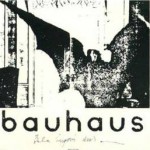Singer Peter Murphy is often called the “Godfather of Goth”, and although he doesn’t seem to like that label it is undeniable that his singing helped to make the Bauhaus song “Bela Lugosi’s Dead” one of the seminal songs of the goth rock genre. Other notable Bauhaus songs from their first active period of 1978-1983 include “Dark Entries”, “Terror Couple Kill Colonel”, “She’s in Parties”, and a smoking cover of David Bowie’s “Ziggy Stardust”.
After Bauhaus folded and the short-lived band Dali’s Car, Murphy launched a solo career that has brought us songs including “Cuts You Up” and “The Sweetest Drop”. His latest album, 2014’s Lion, came out of sessions with Killing Joke’s Martin “Youth” Glover.
This interview was done by Skype on 6/5/15 – fittingly, Murphy was speaking from a cafe in Istanbul during a storm – and was for a preview article for his 6/13/15 concert at SLO Brew in San Luis Obispo.
Jeff Moehlis: What can people look forward at the upcoming concert? Will you be more focused on solo material, doing Bauhaus songs, or a mixture of the two?
Peter Murphy: I’ve been thinking about this. A lot of people ask me when I’m touring what I’m going to be focusing on. As you may know, I did a whole world tour – the so-called Mr. Moonlight Tour – which was me, the first ever time, playing only Bauhaus material. That was in 2013, in the middle of which I worked with Youth to make Lion, the album that was released last year. I started another tour of North America, and then I covered South America.
Before I could get to Europe, Russia, China, and everything else, I postponed it due to what I can only say is management inefficiency and neglect. And nowadays I’m as much of a businessman as an artist. Not through choice, but through what has now become the artist’s empowerment. So I reestablished all that, I found new management under my own terms and all that stuff, plus I’m also based in L.A. a lot of the time.
So this small group of four shows is really based around the Ink’N’Iron Festival show, but I wanted to add three or four other satellite shows in California, one of which is in San Luis Obispo. I’ve never played there, which will be nice because I know it’s a very beautiful place. But the impetus here is that I’m not only a recording artist, actor, and everything else, but I am a performer, so wherever I am I want to play. So in this period where there’s no official extension of the Lion world tour and everything else, I’m still going to play, you know what I mean?
Your question was what you can expect. Well, it will simply be like another extension of the Lion tour, whereby I’ll be playing the Lion work, but also as in every tour, every show, my band knows all of my catalog plus now the Bauhaus catalog, so I have a great wellspring of work that I can draw upon. This time I’ve got about 30 songs I thinking about, and today actually I’ll reduce it to the hour and a half or two hours worth of set time that I’ve got. Basically, my personal nature is that I’m not a rock star promoting. When I go onstage – and I’ve brought my whole band into this whole sensibility – we go onstage and it is only that moment that exists. So I might change it as it happens, and that’s really to do with performance, not being just kind of an imitation or a regurgitation of album tracks. These songs live in that moment, alive, and then they’re the re-enactment in that moment of that thing. It’s really a lot about the performance and the audience.

JM: Your album Lion has been out just over a year. Are you pleased with how your fans have been receiving it?
PM: I knew always that they would be very pleased with it, but that’s not the aim when I make an album. Yes, my audience is always in my mind, but then again, who is my audience? My audience could be much larger. In fact, that then leads into the fact that my audience, even this far in, are like a mixture of all ages, but there is this kind of magnetic center of an artist. There aren’t many of those around now where the audience is so loyal and focused. I’m at once kind of considered a very alternative, seminal artist from this period or that period, but what happens is that as much as people may reminisce about those halcyon days of the early Bauhaus years, that magic is still happening when we hit the stage.
For Lion, remember the context is that I was touring the Mr. Moonlight Tour for a whole year, 2013, and I had arranged with my co-producer and co-writer Youth in London to fly in and to just see what we could come up with. Within the first five day meeting, we came up with in effect the whole album, done, from scratch, with no pre-writing. We then went in on another gap in my world tour schedule for five more days in Andalusia, Spain. I did another five tracks, and I’m proud to say and to remind the general music audience that this is what music is to be, and how it can be made, instantly, improvisationally, and not only that, it’s as real substance to the artist.
In my case, I consider myself one of the last and only few real singers in what might be called rock and roll, and also composers. Youth and I made something, we made Lion in that short period. Now, when you put Lion on, it’s jumping. My hardcore Bauhaus early fans, they always say they miss, they reminisce about what was – but what is there is still there. And this almost surpasses anything I’ve done in one aspect. It’s very much, “Oh my God, he’s still here, he’s not going away, it’s even better.” You see, if I say that being an Englishman who doesn’t like to blow his own horn and do self-promotion, I feel a little bit embarrassed to give that quote. But that’s a quote that I have heard from fans, from press, and everything else. So that’s what the reaction has been.
That aside, that’s only the public perception. The essence of it is that we are artists. We must not be so dependent on others’ reactions. It must always remain as a very intense, passionate artistic experience, when one makes anything, whether it’s a painting, a book, or a record. So that’s how I see Lion, but I’m even now moving on from that, though I’m going to play it. I see that as being one moment. I can’t really talk about who it’s going to be yet, because it might be preempting something, but in L.A. I’m going to be writing with two great fellow writers for the next project. So basically I’m coming to L.A. to do all that, and godammit, I’m not going to not play when I’m somewhere.
Also, in between managers with my assistant – in effect I managed it – I’ve got my new EP which is the remix of Lion, which has no less than nine songs and is going to be released concurrently with those shows. That’s called the Lion Remixes. Those are remixes that Youth and I with his team did even as we were recording. This is very important. It wasn’t an afterthought remix. We were remixing before we’d even finished the album version. I will be offering pre-release EPs on these shows. Not only that, most important, I’m looking forward to visiting San Luis Obispo.
JM: What advice would you give to an aspiring musician?
PM: I would say ignore everybody else – not from a point of arrogance. Understand now that with social media and those tools, one is automatically given a window of independent expression, even before anybody gets involved, like labels. Actually you may not even need a label. So concentrate on the passion.
It depends, because this thing gets into who’s got it and who hasn’t. That becomes an abstraction. Anybody new, if they really want it, they’ve got to want it and feel it is a vocation. Also, if you’re an American – I would say specifically for Americans – dislocate from this notion, pretext, pre-consideration of rock and roll, and what a band means. Dislocate from fashion. Trust in what you enjoy and what makes sense to you. Take it from there. Also, build your own team. There are people that do graphics that can be part of your team, web people, people who are social media savvy, who can be peers in your project. You do not need any special over-priced service until once you get your stuff done.

I can tell everybody this because of Bauhaus in 1979. I’d never sang a song in my life, but I was a writer. When Daniel Ash and I started writing, we wrote half of the first album. When the band got together we made a demo for eleven Pounds, which included “Bela Lugosi’s Dead”, “Dark Entries”, “The Spy in the Cab”. We took that demo to the BBC, to John Peel, and said “Here we are, here’s our new single.” It was on a very small independent label, which only pressed 5,000. Nobody noticed it. He played it once. People hear what’s good, and that was the genesis of our particular line of exposure. So that’s what I would say to them.
I’m going to do some lectures and tell kids. There’s a school here in Istanbul that just opened, and the owners just asked me to do some workshops. But my workshops will not be musical, they’ll be something in the terms that I just spoke.
America has always supported art. In England it’s always harder. It’s gray, it’s cynical. That’s why only the best come out of England. If not, they’re fucked [laughs]. In America, the best and the worst have a voice, which is lovely. In England, if you’re not good, fuck off.


Discussion
No comments for “Interview: Peter Murphy”